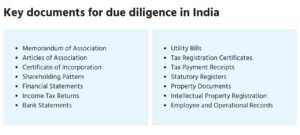Due Diligence in India



"*" indicates required fields
It is crucial to screen the background of your potential Indian partner extensively before you start your cooperation. In this article, we explain how you can perform a thorough due diligence of an Indian company (Private Limited).

Due Diligence in India
Due diligence is usually conducted prior to the acquisition of a business or investment in a business by the acquirer or investor. It is sometimes referred to as due diligence, but a proper due diligence process goes beyond just checking the financial statements. Due diligence helps in making the right decision and mitigating the risks associated with the business transaction. Both parties usually enter into a confidentiality agreement before initiating a due diligence because sensitive financial, operational, legal and regulatory information is revealed during the due diligence process. It is the responsibility of the seller of the business or the shareholder to provide the documents and information required for conducting due diligence. India is no different. The following are the documents that are usually required for conducting due diligence on a private limited company. All these documents need to be thoroughly reviewed by an expert in India to make an informed decision:

MCA Document Checking
A major part of a company’s due diligence can be done with the help of the Ministry of Corporate Affairs (MCA). The MCA regulates corporate affairs in India through the Companies Act, 1956, 2013 and other related laws and regulations. All companies in India are required to file their financial and shareholder details with the MCA. This master data of each company is also available on the MCA website. The documents are approved by the Registrar of Companies (ROC) before being filed with the MCA. All documents filed with the ROC are made available for a fee. The information provided by the MCA is available for one day and is provided under the Right to Information Act. The information collected in this step includes:
1. Financial statements;
2. Annual reports;
3. Legal proceedings against the director or the company;
4. Right of retention on the assets;
5. Any problem with non-compliance with the law/regulations.
This mainly concerns documents that were submitted after September 16, 2006. Before this date, documents were submitted to the ROC in physical form. These documents were stored in the respective ROC and are not accessible online. To inspect these documents, one must visit the ROC in question.
Reputation
In addition to legal information, it is wise to investigate the reputation of the company in the market. How is the company generally known among customers, suppliers, employees and other stakeholders? Does the company have a good and reliable name in the market? Does the company have a good payment reputation? Has the company previously entered into other strategic partnerships and how did that go?
Apart from their own website (usually in English), the professional association of the sector in which the company is active can be an interesting source of information. There are also a number of important national business organizations in India, which often have regional branches. The main ones are:
- Confederation of Indian Industry (CII): www.cii.in
- Federation of Indian Chambers of Commerce and Industry (FICCI): www.ficci.com
- The Associated Chambers of Commerce of India (ASSOCHAM): www.assocham.org
- Chamber of Commerce and Industry (PHD): www.phdcci.in
Finally, the Credit Information Bureau (India) Limited (CIBIL) website allows you to check the credit history of an individual, company or partnership. Any disputes/cases that have been filed against the company can be checked and also whether they have ever been declared a wilful defaulter in the past.
Thinking of a merger, M&A or setting up a Joint Venture?
Partnering with an Indian company can be a good way to enter the Indian market. With a good Indian partner, you immediately have an extensive network, knowledge of the market and you share the business risks. However, setting up such a collaboration involves legal rules and conditions. IndiaConnected helps companies to realize mergers, M&A and joint ventures as a trusted person and sparring partner. We support parties throughout the entire process: from partner search to due diligence and negotiations.








